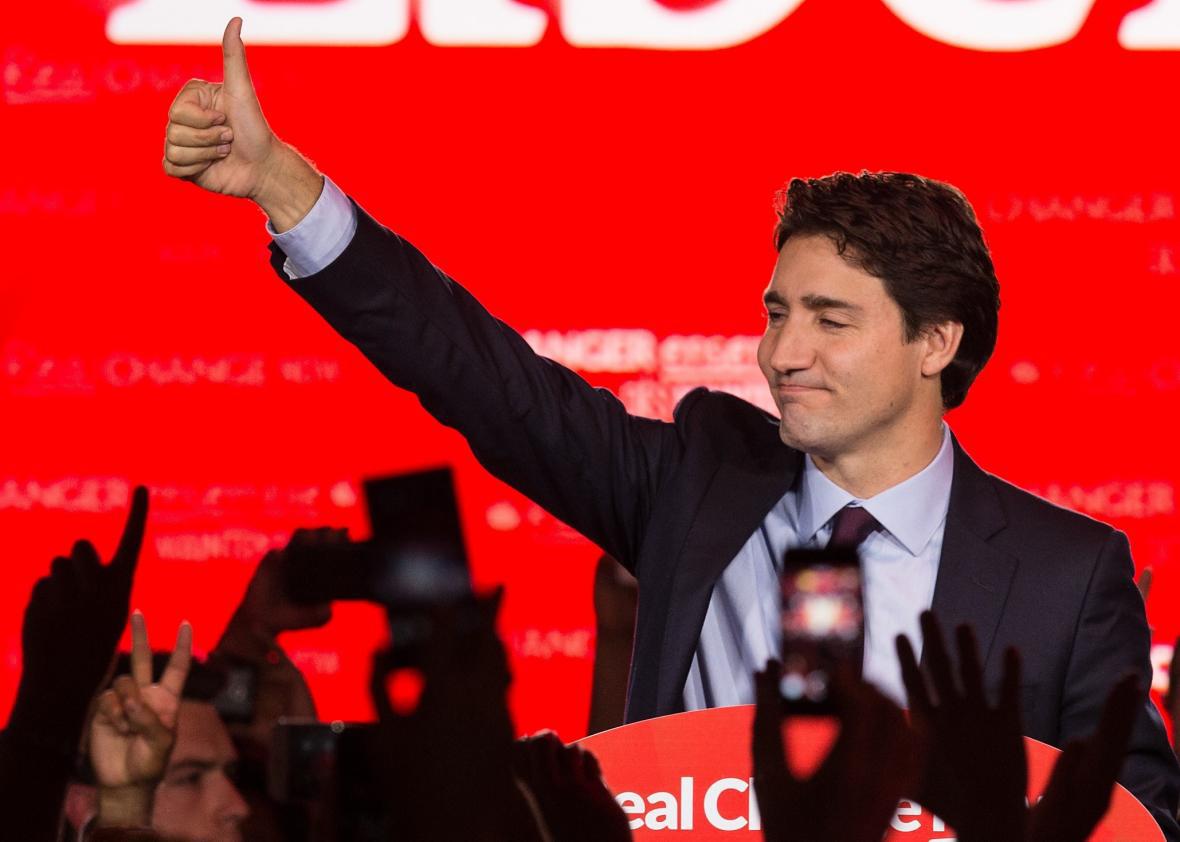What did Canadians vote for during their national elections this week? First and foremost, a new prime minister with surprisingly sultry good looks. But beyond that, our northerly neighbors seem to have cast their ballots for a party that promised to take a sane approach to government spending and run a budget deficit. Americans, please take note.
Oil-exporting Canada has been stuck in an economic rough patch lately thanks to the collapse of crude prices—the country actually fell into a light recession during the first half of this year, and many fear the collapse of what might be a very large housing bubble. The conservative government, led by Prime Minister Stephen Harper, largely responded with the by now all-too-familiar austerity playbook, promising to balance the budget while offering some tax breaks for homeowners.1 The opposition New Democratic Party did much the same. But the Liberal Party, led by Justin Trudeau, took the opposite tack, promising to run small deficits for three years in order to fund a $46 billion infrastructure spending plan.
Last night, the Liberals and Trudeau surged to victory, largely on the strength of their economic platform. This is good news for Canada: Given the state of the world economy, it is absolutely insane that more rich countries aren’t running larger deficits.
How come? Because this is an incredibly inexpensive moment for governments to borrow money. In fact, it may be the best time in recorded history for sovereigns to load up on debt. Interest rates have been hovering around zero more or less since central banks cut rates during the recession, and given the many economic headwinds before us, it may be a long while before they rise much higher. At points this year, countries have issued bonds with negative interest rates—meaning investors are literally paying governments to hold their money because they can’t think of anything safer to do with it. In circumstances like that, when the global bond markets are basically shouting “treat yo’self” at just about every finance minister in the developed world, the only reasonable move for a government is to borrow and use the free or nearly free money to make investments that might help the economy grow long-term, like building or fixing up roads, bridges, and other infrastructure.
This is precisely what the Liberals and Trudeau have vowed to do. Canada can’t quite get money for nothing—at the moment, the yield on a 10-year government bond is 1.39 percent, just barely above inflation—but there probably won’t be a much better time to borrow and spend. As the party put it in a policy paper this summer, “Interest rates for new investment are at historic lows, our current infrastructure is aging, and Canada is in immediate need of a boost in economic growth.”
If anything, the one problem with the Liberal plan is that it’s too cautious. The party says it will run annual deficits no higher than roughly $7.7 billion, or less than half a percentage point of GDP, for three years before balancing its books. Why not think bigger? Oil prices probably aren’t coming back anytime soon to restore growth, and surely Canada can find a few additional ice-ravaged roads to patch up. Meanwhile, there isn’t going to be any time like the present.
Still, Trudeau’s Liberals are offering a reasonable, if imperfect, example for other governments around the world that have imprudently embraced fiscal prudence at a time when the global economy seems to be softening. That includes the United States, which is running its smallest deficit since 2007. Even if our economy isn’t in dire need of fiscal stimulus, our national infrastructure could desperately use some TLC. And unless we plan to just let our bridges collapse, we’ll have to spend on those improvements sooner or later, so it might as well be when we can get a good deal on the financing. We’d do well to take a page from this particular worthwhile Canadian initiative.
1Harper tried to run a surplus this year, but the sour economy turned it into a projected deficit.
